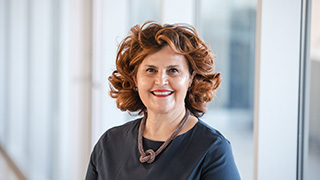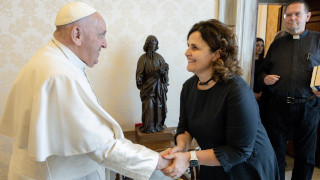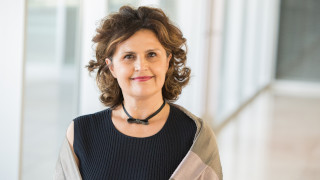Religious Thought Leader Featured in Global Media on Ecumenism and University History
Monday, January 8, 2024
 Ines A. Murzaku, Ph.D., professor, Department of Religion, director, Catholic Studies Program, and founding chair, Department of Catholic Studies, highlighted issues crucial
to the Church in the 21st century in interviews and thought leadership pieces including
The Catholic World Report and Our Sunday Visitor, discussing ecumenism, Church unity, and the history of Seton Hall University.
Ines A. Murzaku, Ph.D., professor, Department of Religion, director, Catholic Studies Program, and founding chair, Department of Catholic Studies, highlighted issues crucial
to the Church in the 21st century in interviews and thought leadership pieces including
The Catholic World Report and Our Sunday Visitor, discussing ecumenism, Church unity, and the history of Seton Hall University.
In December, Murzaku wrote "The blood of Saint Januaris and ecumenical light in Naples," for Catholic World Report on a recent miraculous event: the liquefaction of the blood of St. Januarius in the hands of the Ecumenical Patriarch of Constantinople." Murzaku asserted that this miraculous occurrence "could be interpreted as an auspicious omen for ecumenical unity between East and West." In this Advent season, our aspirations should extend beyond mere hope; we should cultivate an ecumenical hope— a hope that transcends divisions and fosters authentic unity among Christians." The article was subsequently republished by New Advent.
Murzaku notes:
In his Lectio Magistralis, Patriarch Bartholomew I delved into several key topics, primarily focusing on historical memory–examining significant events in the history of the undivided Church and advocating for a purification of memory. He emphasized that the shared Christian history, founded on the pillars of Scripture, Tradition, and Patristic authority, is pivotal in fostering a reinvigorated commitment to the ecumenical movement and promoting unity between the Eastern and Western Churches.
Murzaku focuses on the Patriarch’s statements and actions:
The Patriarch’s Lectio Magistralis not only echoed his previous statements but also reinforced his actions towards achieving complete Christian unity between the Catholic and the Orthodox Churches. However, a prevailing question remains: When will full Eucharistic unity between the Orthodox and Catholic Churches be realized? This query, frequently raised by various audiences, continues to stimulate widespread interest and discussion. My stance is one of optimism—such unity may be attained sooner than we anticipate. The pursuit of unity is a collaborative effort—humanity strives, and it is God who blesses and perfects these endeavors. As the Patriarch mentioned in his recent interview with Avvenire, the future, including our commitment to unity, ultimately rests in God’s hands. Nevertheless, it remains imperative that we persist in doing all that is humanly achievable in this pursuit.
As a regular and prominent contributor to The Catholic World Report, Murzaku is invited annually to share a list and discussion of the books she read during the year that most strongly influenced her. The books she listed included several about synodality and Church unity, as well as two that focus on Mother Teresa, about whom Murzaku is currently writing her next book for Routledge Press later this year. Further, Murzaku included a highly anticipated volume by a preeminent scholar of Seton Hall and American Catholic history: Seton Hall University: A History, 1856-2006, written by Dermot Quinn, D.Phil., professor and director of graduate studies in the Department of History and Editor of The Chesterton Review.
Murzaku was interviewed for her expertise and scholarship on the relations between Eastern and Latin Catholics by Our Sunday Visitor News for "As Eastern, Latin Catholics discover each other’s richness, the bonds grow," published widely including in Catholic Review. As Murzaku was baptized into the Italo-Albanian Byzantine Catholic Church in Rome and is a parishioner at a Roman Catholic parish in New Jersey, she has a unique perspective on Church unity and the opportunities for different traditions to enrich one another. She stated that "liturgical and cultural diversity contributes to a more inclusive and universal Catholic identity."
Raising awareness is important, explained Murzaku, who said, "Many people, including faithful Catholics, are generally unaware of the history of the Eastern Catholic churches."
 Murzaku provided her own insights, sharing that Eastern Catholic churches’ "experience
of remaining in communion with the bishop of Rome while preserving their Eastern traditions
can serve as a model for discussions on church unity and theological reconciliation."
"This principle of the centrality of the Church being marked by universality is borne
out in Murzaku’s scholarly work, as well as in her professional activity and her service
to the Church." Murzaku, many of whose scholarly publications focus on ecumenism and
Eastern/Western Church unity, recently enjoyed a private audience with Pope Francis, who had written the preface for the translation of her book into Albanian. In 2023,
she also accepted the invitation to join the International Women’s Network, a new initiative of the Vatican Dicastery for
Interreligious Dialogue, as well as the invitation to join the Inter-Religious Dialogue and Peace-Building Research Group of the Institute of
European Studies and Human Rights at the Pontifical University of Salamanca in Spain.
Murzaku provided her own insights, sharing that Eastern Catholic churches’ "experience
of remaining in communion with the bishop of Rome while preserving their Eastern traditions
can serve as a model for discussions on church unity and theological reconciliation."
"This principle of the centrality of the Church being marked by universality is borne
out in Murzaku’s scholarly work, as well as in her professional activity and her service
to the Church." Murzaku, many of whose scholarly publications focus on ecumenism and
Eastern/Western Church unity, recently enjoyed a private audience with Pope Francis, who had written the preface for the translation of her book into Albanian. In 2023,
she also accepted the invitation to join the International Women’s Network, a new initiative of the Vatican Dicastery for
Interreligious Dialogue, as well as the invitation to join the Inter-Religious Dialogue and Peace-Building Research Group of the Institute of
European Studies and Human Rights at the Pontifical University of Salamanca in Spain.
"I am honored to be able to share my experiences and my scholarship, especially when I can do this in the service of promoting Church unity," Murzaku said. "In particular, I enjoy opportunities to discuss how Church history has led us to our current situations and has prepared us to take steps to improve intercultural understanding and peace. More profound peace and the promotion of human dignity are, after all, the fruit of rigorous academic study, authentic humanitarian work, and the practice of our Faith."
To read the full articles, visit The Catholic World Report’s article on "The Blood of Saint Januaris" and "The Best Books I read in 2023," and OSV News/Catholic Review.
Categories: Faith and Service

